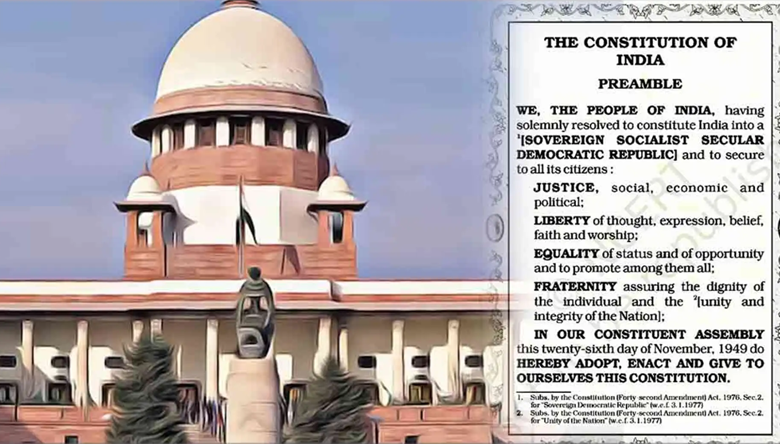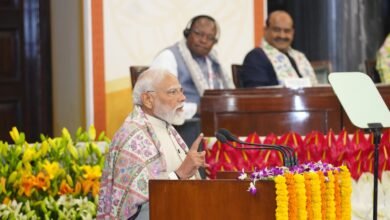The SC affirms the Constitution’s Preamble’s use of the terms “socialist” and “secular.”

News Mania Desk / Piyal Chatterjee / 26th November 2024
“These terms have achieved widespread acceptance, with their meanings understood by ‘We, the people of India’ without any semblance of doubt,” the Supreme Court said Monday, dismissing petitions contesting the constitutional validity of the 42nd amendment, which added the words “secular’ and “socialist” to the Preamble of the Constitution during the Emergency days in 1976.
A panel of Chief Justice of India Sanjiv Khanna and Justice Sanjay Kumar rejected the claim that the words could not have been added retroactively in 1976 to the original Preamble, which had a deadline of November 26, 1949, and stated that the Parliament’s authority under Article 368 to amend the Constitution also extends to the Preamble.
“The fact that the Constitution was adopted… on the 26th day of November, 1949, does not make any difference. The date of adoption will not curtail or restrict the power under Article 368 of the Constitution,” the bench said, adding “the retrospectivity argument, if accepted, would equally apply to amendments made to any part of the Constitution, though the power of the Parliament to do so under Article 368, is incontrovertible and is not challenged”.
The court, which refused to even issue notice on the petitions, said the “writ petitions do not require detailed adjudication as the flaws and weaknesses in the arguments are obvious and manifest”.
The SC judgement said that “while it is true that the Constituent Assembly had not agreed to include the words ‘socialist’ and ‘secular’ in the Preamble, the Constitution is a living document, as noticed above with power given to the Parliament to amend it in terms of and in accord with Article 368”.
It said, “In 1949, the term ‘secular’ was considered imprecise, as some scholars and jurists had interpreted it as being opposed to religion. Over time, India has developed its own interpretation of secularism, wherein the State neither supports any religion nor penalizes the profession and practice of any faith. This principle is enshrined in Articles 14, 15, and 16 of the Constitution…”
On the challenge to the word ‘socialism’, the SC said “in the context should not be interpreted as restricting the economic policies of an elected government of the people’s choice at a given time… Rather, ‘socialist’ denotes the State’s commitment to be a welfare State…”
Rejecting the argument that the amendment was made during Emergency imposed by the then Indira Gandhi government, the SC said this point “was previously deliberated in Parliament, during the consideration of the Constitution Forty-Fifth Amendment Bill, 1978…Subsequently, this Bill was renumbered and called the Constitution Forty-Fourth Amendment Act 1978”.
It also said “the fact that the writ petitions were filed in 2020, forty-four years after the words ‘socialist’ and ‘secular’ became integral to the Preamble, makes the prayers particularly questionable… These terms have achieved widespread acceptance, with their meanings understood by “We, the people of India”. The additions… have not restricted or impeded legislation or policies pursued by elected governments, provided such actions did not infringe upon fundamental and constitutional rights or the basic structure of the Constitution…”






